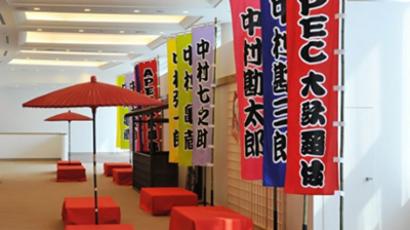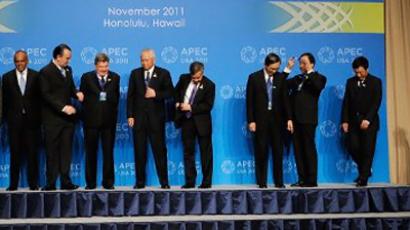‘US is a declining power and has trouble adjusting’
The APEC summit in Honolulu revealed sharp divisions between the US and China, US growing critical over Beijing's control of the value of the Yuan. But experts believe it could take over as the world's reserve currency if China can meet expectations.
CEO of Country Risk Solutions Daniel Wagner has told RT that each passing APEC forum and other events on the global stage clearly show that China is really in the driver’s seat in many respects. “This is coming at an awkward times for the U.S., because it is clearly a declining power at the same time it is having trouble adjusting to what that means,” he told RT. “At the same time China is having a bit of a challenge adjusting to what it means to be a truly global player. And it had in the past not really lived up to some of the expectations of some other of the world powers and it is finding its own footing in that regard.”“I think what we are seeing is a real paradigm shift now,” he went on. “Whether it is with one of the BRICS countries, or with Indonesia, with South Africa , with some of the lesser known emerging global powers. They all are having a difficult time deciding exactly how they should enter the world stage, what role they can play there and how they can have the most impact.” Commenting about the eurozone debt crisis and China’s ability to step in and save the Euro, Daniel Wagner gave his reasons why Beijing is not in a hurry to hand over the cash. “China is being very cautious and very sensible in taking its time before reacting, simply not wanting to throw good money after bad,” he said. “They question – Why should we do that? You need to give us a good reason why we should throw you a lifeline. They realize they have a great opportunity to do so and at the same time they really don’t want to do so, if they are simply going to throw their money away.” Wagner is convinced there is not really anything that can replace the US dollar right now. “The Yuan is not fully convertible on the capital and in the current account , certainly the euro doesn't look like it is in any position to take the lead.,” he said. “What currency would take the lead at this point? I think in due course there will be an emerging shift and my guess is that the Yuan will ultimately make it. But before that happens, it is probably another 5 or 10 years and the Chinese are going to have to do a lot more to insure that there is a greater degree of confidence in the Yuan going forward. “
But George Koo, the founder of International Strategic Alliances, believes apparent tension between the U.S. and China at the APEC forum can only damage America, He thinks China bashing ahead of the U.S. presidential election hurts rather than helps economic recovery.“I attribute a lot of the negative [[rhetoric]] to domestic politics, the run up to 2012 presidential election, which is actually very disappointing,” he told RT. “Certainly members of Congress have enjoyed the lowest esteem right now in the American population. I think 9 out of 10 don’t think much of them and their lack of leadership and statesmanship”.“It is really unfortunate because if they see it differently they would recognize that inviting Chinese investments into the US will be good for the US. It would be helpful to the US local economy,” he went on. “To be so unwelcoming and so hostile to Chinese investments is actually against our own interests. And it seems an easy path to take. They all seem to try to outdo each other in being anti-China at this point. The way I see it – it is a usual cyclical run up until we have presidential election and everything will be back to reality after that and things will calm down.”














